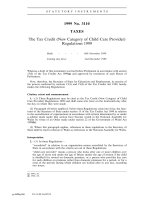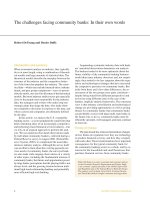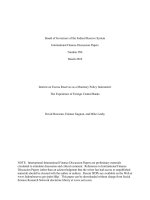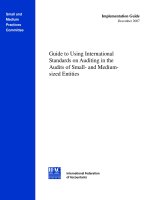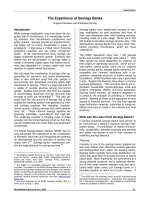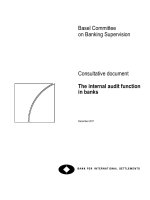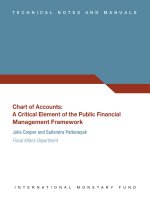THE DUTIES OF THE PUBLIC CHARITABLE SAYINGS'''' BANKS? ppt
Bạn đang xem bản rút gọn của tài liệu. Xem và tải ngay bản đầy đủ của tài liệu tại đây (828.99 KB, 15 trang )
WHAT AKE
THE DUTIES
OF THE
PUBLIC
WITH
REsricr
TO
CHARITABLE
SAYINGS' BANKS?
A PAPER READ BEFORE
THE
DUBLIN STATISTICAL SOCIETY,
ON THE
19TH
OF APRIL, 1852.
BY W. NEILSON HANCOCK, LL.D.
DUBLIN:
HODGES AND SMITH, 104, GRAFTON STKEET,
No.
01.]
BOOKSELLERS TO THE UNIVERSITY.
1852.
Bublm
PRESIDENT*
HIS GRACE
THE
ARCHBISHOP
OF
DUBLIN,
VECE-PRESIDENTS.
THE
EARL
OF
ROSSE
THE
BISHOP
OF
CORK.
MOUNTIFORT
LONGFIELD,
Q
C
LL
D.
PROFESSOKINGRAM,LL
D.F.T.C.D.
ROBERT BALL,
LL.D-
JAMES HAUGHTON,
ESQ.
PROFESSOR ALLMAN,
M.D.
JONATHAN
PIM,
ESQ.
JAMES W.
W
MXJRI*AND,
ESQ.
MAJOR
THOMAS
A.
LARCOM,
R E.
THE
PROVOST
OF
TRINITY
COLLEGE,
SIR
ROBERT
KANE.
OF COUNCIL.
REV
GEO
LONGFIELD,
F.T C I>.
CONWAY
E.
DOBBS, JLJN
ESQ.
EDWARD BARRINGTON,
ESQ
RICHARD BARRINGTON,
ESQ.
WILLIAM HOGAN,
ESQ.
T. E.
CLIFFE LESLIE,
LL.B«,
TREASURER.
GEORGE JOHNSTON ALLMAN, LL.B.,
5,
Trinity College.
SECRETARIES-
PROFESSOR HANCOCK, LL.D.,
40,
Trinity College.
PROFESSOR HUSSEY WALSH, LL.B., 27, Sumnier-hili
•LIBRARIAN
RICHARD^D. WEBB,
Esq., 176,
Great Brunswick-street.
AUDITORS-
ARTHUR SHARMAN CRAWFORD,
ESQ.
|
MAZIERE
J.
BRADY,
ESQ.
LEOTORERS
IN
POLITICAL
JAMES
A.
LAWSON,
LL.D.
|
PROFESSOR MOFFETT,
LL.D.
THIS
society
was
established
in
November, 1847,
for
the purpose
of
pro-
moting
the
study
of
Statistical
and
Economical Science.
The
meetings
are held
on the
third Monday
in
each month, from November till June,
inclusive,
at 8, p.
M.
The
business
is
transacted
by
members reading
written communications
on
subjects
of
Statistical
and
Economical Science.
No communication
is
read unless
two
members
of
the
council certify that
they consider
it
m
accordance with the rules and objects
of
the society.
The
reading
of
each paper, unless by express permission
of
the council previously
obtained,
is
limited
to
half an hour.
Applications
for
leave
to
read papers should be made
to the
secretaries
at least
a
week previously
to the
meeting.
Proposals
of
candidate members should
be
sent
to the
secretaries
at
least a fortnight previously
to the
meeting.
The subscription
to the
society
is
one pound entrance,
and
ten
shillings
per annum.
What are
the duties
of the Public with
respect
to
Charitable
Savings'
Banks? By W. Neilson Hancock, LL.D.
IN
considering the question to which I propose to direct your atten-
tion in this paper, it will be necessary m the first instance to
explain with precision the sort of institution which I mean to
describe by the term, Charitable Sayings' Bank.
If the Bank of England, ike Bank of Ireland, or any other of our
large banks opened a savings' department, and received small
deposits from the poor, the new department might be .called a
savings' bank. In such an institution the shareholders of the bank
would, to the extent of their entire property, be liable for the acts
of their clerks and managers. So that the sole responsibility as to
the successful management of the business would rest with the
directors, and the depositors would have very large security for
any sum actually paid to the clerk. Again, that part of the natural
business of bankers, which consists in receiving deposits from the
poor, might be undertaken by some public officers appointed for the
purpose, just as the granting of money orders, another part of the
same business, is carried on by the officers of the Post Office Such
an institution would be called a savings' bank. And in it, the go-
vernment would be responsible to the depositors for the acts of the
clerks. So that the entire responsibility of management would rest
with the members of the government in charge of that department,
and the depositors would have perfect security for any money
actually paid to a clerk.
Here then are two kinds of savings' bank, a joint stock savings
7
bank, and a government savings' bank. But the sort of institution
to which I am about to direct your attention, is quite distinct from
these in some essential characteristics. In the charitable savings'
banks which now exist in the United Kingdom, the responsibility
of management is divided between the department of government
which has charge of the reduction of the national debt, and the
charitable managers
;*
and neither the government nor the managers
are necessarily liable for the acts of their clerks. And the question
I propose to discuss is, what is the duty of the public with regard
to such institutions ?
Charitable savings' banks are of very recent origin; the first hav-
ing been established since the commencement of the present century
in one of the suburbs of London The parties managing the earliest
institutions were, like private bankers, liable to the extent of their
whole property to the depositors, for their own acts or for the acts
* For conciseness I frequently use the term
managers
only, but in every
savings' bank there are
trustees
as well as managers, and in all my observa-
tions in this paper I include trustees under the term managers.
of their clerks In 1817, these institutions had made such a favour-
able impression on public opinion, that it became part of the policy of
the legislature to promote their formation. And accordingly, in that
year, an Act was passed for Ireland (57 Geo. III., c. 105), entitled
" An Act* to encourage the Establishment of Banks for Savings."
Subsequent Acts were passed in 1818, 1821, and 1825, but were
repealed in 1829, by the Act which has in most particulars regu-
lated these institutions since that time; it is entitled,
u
An Act to
consolidate and amend the laws relating to Savings' Banks."
The objects of the legislature, in encouraging these institutions, is
very simply and plainly stated in one of the recitals in this Act:—
" Whereas certain banks for savings have been established in Eng-
land and Ireland, for the safe
custody
and increase of small savings
belonging to the industrious classes of his Majesty's subjects, and it
is expedient to give protection to such institutions and the funds
thereby established, and to afford encouragement to others to form
the like institutions." By this Act, the divided responsibility m the
management appears very clearly. The managers have the appoint-
ment of the clerks; they have the receipt and payment of the
deposits ; but in lending the money their power is restrained, for
they are prohibited from lending it to any other persons than the
Commissioners for the reduction of the National Debt. The entire
management of the money so lent, m investing it in the funds, in
selling out, and in paying interest to the managers, is given to the
Commissioners. The Commissioners, again, have power to require
an annual account from the managers, to issue orders to them, and
to stop any bank that does not furnish accounts and obey orders ;
so that there is as distinct a case of divided responsibility as can be
conceived. Considerable doubts have arisen on the construction of
this Act, as to the exact nature and extent of the authority of the
Commissioners over the managers. But that they have some au-
thority, involving, as all authority does, some responsibility, never
could be and never has been for an instant doubted.
As to the liability of the government for the acts of the clerks, it
is plain that these clerks bemg appointed by the managers are their
servants, and not the servants of the government; that conse-
quently the government, though liable for any money actually
invested m the names of the commissioners, is not legally liable for
any money paid to a clerk or manager, but not invested by him;
and so it seems always to have been considered, that the govern-
ment is not legally liable for the acts of the clerks of the savings
7
banks.
What is the extent of the moral liability of the government,
I shall have occasion to investigate in a subsequent part of this
paper.
As to the liability of the managers for the acts of the
clerks, we have seen that at the original formation of savings'
* A similar Act was passed for England in the same session, 57 Geo. III.,
c. 130.
banks,
the managers were liable for their clerks to the extent of
their whole property. Whether from the original formation till
1829,
any change took place in respect to the liability of managers,
I have not ascertained. But in 1829 their liability was limited to
their own acts, and to anything they did in cases where they were
guilty of wilful neglect or default. In the cases of Killarney and
Tralee, awards were made against the managers under this pro-
vision of the' law, in cases where, owing to their wilful neglect or
default, the clerks were enabled to embezzle money. In the
Act for the formation of regimental or military savings' banks
(5 & 6 Vic , c. 71), passed in 1842, a similar provision was intro-
duced for limiting the liability of managers, and the law respecting
their liability continued in the same state from 1829 till 1844, when
a most important change took place.
In 1844 an Act was passed (7 & 8 Vic, c. 83), which provided
that no manager should be liable to make good any deficiency
which might thereafter arise in the funds of any savings' bank,
unless he had declared in writing that he was willing to be liable.
He might limit his liability, but he was declared personally respon-
sible for all moneys actually received by himself and not applied.
Here, then, an entirely new principle was introduced, that no matter
what the neglect or defaiilt of the managers might be, they were
not to be liable unless they had actually pocketed the money them-
selves, or unless they had stated that they were willing to be liable.
Under the Act of 1844, the managers of the Killarney and Tralee
banks,
though guilty of as great neglect and default in respect of
deposits received after the passing of this Act, as in respect of those
received before 1844, were freed from liability in respect of the
later deposits, although awarded to pay the eailier ones. Such is
the state of the liability of managers of English savings' banks at
the present day. They are not liable for their clerks at all, unless
they choose to be so; and if they choose to be liable, they are not
liable for a larger sum than they are willing to state.
After the passing of the Act of 1844, the savings' banks of Tralee,
Killarney, Mallow, and Cuffe-street in Dublin, stopped payment
An investigation took place, both by the barrister who has charge
of savings' banks, and by a Committee of the House of Commons;
and the law respecting the liability of managers was changed once
more. By an Act (11 & 12 Vic, c 133) passed in 1848, for two
years only, the previous exemption from liability was repealed with
respect to Irish savings' banks, the liability for wilful neglect or
default was restored, but it was provided that a manager might
limit his liability by written instrument to any sum not less than
£100.
Since the passing of the Act of 1848, failures have taken
place at Eochdale, Scarborough, and other places in England; but
although it was last year renewed for two years more, it has not
been extended to England. Under the Act of 1848, the whole
extent to which the Irish managers are liable for their clerks, is in
case of wilful neglect and default on their own part, to the extent
of £100 each, or such larger sum as they may name. So it is
manifest that our sayings' banks fulfil the description I have given
of them. The responsibility of management is divided between the
managers and the commissioners; and neither the government nor
the managers are at all responsible for the acts of the clerks—unless
the managers are guilty of wilful neglect or default; and even then
the liability of Irish Managers is limited to such sum not less than
£100 as they shall name, and English Managers are free from all
liability unless they choose to make themselves liable.
Having thus explained the nature of these institutions as to
management and liability, I have next to notice the objects for
which they were founded, and to inquire how far they are calculated
to attain these objects. There are few institutions that have
received a larger amount of praise and commendation than savings'
banks.
But the two objects which seem to have had most influence
in securing the co-operation of the wealthier classes as managers,
are the encouragement of saving habits amongst the poor, and the
increase of stability of our political institutions, by giving the
poorer classes an interest in the preservation of public credit. The
first of these objects is stated by M'Culloch. In his " Statistics of the
British Empire," he says, " Savings' Banks are very valuable in-
stitutions, and are eminently entitled to public patronage and
support. The want of a safe place of deposit for their savings,
where they would yield them a reasonable interest, and whence
they could withdraw them at pleasure, has formed one of the most
serious obstacles to the formation of a habit of accumulation amongst
labourers." Again he adds,
u
They now feel assured that their
savings, and the interest accumulated upon them, will he faithfully
preserved
to meet their future wants." From this it is manifest, that
the whole success of savings' banks, as a means of encouraging a
habit of saving, depends on their affording a perfectly safe place of
deposit, and on their being so managed as to warrant the labouring
classes in believing that their money is faithfully preserved for
them. It is equally plain that savings' banks will not make the
poor more careful of the public credit, unless the public credit is
strictly observed towards themselves: in other words, unless their
deposits, in institutions where the government has a share in the
management, are perfectly safe The whole success of savings'
banks,
the probability of their attaining the objects for which they
have been established, the benefit that they can possibly confer on
the community, all depend on the security which the depositors
have for their money.
The simplest way of testing that secuiity will be, to take the
history of a case that has happened within our own time in this
city, the facts respecting which were made public by the Keport of
a Committee of the House of Commons. In 1818, the St. Peter's
Parish Savings' Bank was established in CufFe-street, in Dublin,
and a Mr. Dunne, the parish sexton, was appointed cashier and
book-keeper at a salary of £5. The trustees and managers of the
bank included some of the most influential and respectable of the
inhabitants of Dublin. The late Archdeacon Torrens was a trustee
and security for Mr. Dunne; the late Judge Johnston was also a
trustee; and the present Lord Chief Justice, then Sergeant Lefroy,
was another.* Under such influential patronage, the bank rose in
importance, and large sums of money were lodged, which must
have amounted in 1831 to upwards of £100,000.
In 1826, one of the managers began to suspect that all was not
right, and that Mr. Dunne was making away with some of the
money. A dispute then commenced m the committee of manage-
ment as to Mr. Dunne's character, and it took the committee
exactly five years to ascertain whether Mr. Dunne was worthy to
be trusted or not
In February, 1831, the defalcation was finally discovered, in the
manner described by one of the managers: " I think the board
came to the decision that Mr. Dunne should not be continued, after
an immense deal of battling for a year or two, and I think Mr.
Dunne was got to resign: he had not many days resigned, before an
account came in, a pass-book came in for payment, and on investi-
gating and comparing it with the ledger, it was found to be closed
in the ledger though open in the pass-book, and Mr. Dunne then
suddenly absconded.'' The first step the managers took on this
event was a very proper one; they issued a notice of the actuary
having absconded, and called on the depositors to produce their
books. A number of claims at once appeared. They at first thought
the defalcation would amount to £1000; they soon found it to
exceed £2000.
The managers then proceeded to consult the Commissioners for
reducing the National Debt, as to what they should do. They
drew up a statement of what had happened; asking the commis-
sioners for advice and assistance
;
suggesting that a commissioner
should be appointed to inquire into the management of the bank,
and the cause of the frauds, and either remodel or close the bank.
This statement one of the managers took to London, and on waiting
on the secretary of the commissioners, was referred by him to Mr.
Tidd Pratt, the barrister appointed to certify the rules of savings'
banks,
and to be judge of disputes between depositors and managers.
This gentleman then filled, and still fills, an office m which judicial
and executive functions are very unwisely mixed together. The
managers applied to him in his executive capacity, as law adviser
of the commissioners as to savings' banks ; he entertained their
* As the name of the Archbishop of Dublin appeared for some time
amongst the list of patrons, it was supposed by many that Archbishop
Whately had been connected with the CufFe-street Bank. His Grace how-
ever stated at the meeting of the Statistical Society that he had never been
connected with it, and that when he was told that credit had been obtained
from the impression of
his
sanction, he took the earliest opportunity of dis-
abusing the public of the error, by explaining that it was his predecessor
who had been a patron.
application in his judicial capacity; and offered to decide any dis-
putes between the managers and the depositors, many of which had
arisen as to the rights of parties who had entrusted their money to
Mr. Dunne, but which had not been duly lodged by him. Mr.
Pratt accordingly came over to Dublin in his judicial capacity, and
awarded £7,500 to be paid by the managers. He also awarded
that £4,274 claimed was not a legal charge against the managers, as
that amount had been lodged with Mr. Dunne out of the bank, and
out of bank hours. Taking a strictly judicial view of his duties, Mr.
Pratt did not decide whether the managers had been guilty of
wilful neglect or default, as that question was not directly raised.
But thoiigh in this essential point he confined himself to acting in
his judicial capacity, he volunteered advice in his executive ca-
pacity, firstly, that the £4,274, which was not
a
legal charge on the
funds of the institution, should be paid out of future profits
;
and
secondly, that the managers ought to carry on the bank, as the
future surplus would realize enough to pay all deficiencies. These
opinions were given by Mr Pratt, although it was stated to him
that the bank was insolvent, and although no account had been
furnished for two years as required by Act of Parliament. They
were given, too, without any accurate inquiry into the state of the
affairs of the bank; as he took the statement for 1828, without
seeming to have been aware that it was not the statement for 1830.
Mr. Pratt seems to have had the greatest objection to extra judicial
inquiries
;
and when asked why he did not enquire into the neglect
or default of the managers, or into the state of the affairs of the
bank, he puts forward the plea that these points were not raised
by the depositors: but he seems to have had no objection to give
extra-judicial opinions on points that he should not have advised
on without the most anxious and careful inquiry. From the super-
ficial inquiry Mr. Pratt made into the concerns of the bank, he was
under the impression that the defalcations did not exceed £4,000;
and as the bank had made £3,500 from 1818, and as Mr Dunne's
sureties were liable for £1,000 more, he thought he was warranted
in the advice he gave. The bank was accordingly carried on; and
the managers, no doubt with a view of gaining confidence, did not
wait for the future profits, but at once paid out of incoming de-
posits the £4,274 which Mr. Pratt had decided was not a legal
charge. They also, with a view to keep up their credit, omitted to
post in the office the annual statement of accounts, as required by
the Act of Parliament, from 1831 till 1848. These accoimts they
furnished annually, however, to the Commissioners for the reduc-
tion of the National Debt; showing, after 1832, in every year a
deficiency. The managers had asked Mr. Tidd Pratt whether the
commissioners would receive the accounts short, and he said they
would.
From 1831 till 1838, the defalcations of Mr. Dunne gradually
came to light; and instead of the £2,000 supposed by the managers,
or the £4,000 conjectured by Mr. Pratt, these defalcations turned
out to have been to the extent of about £25,000; for in that year
the annual funds of the bank showed a deficiency of about £25,000.
How a parish sexton could have spent £25,000 in thirteen years,
without being detected, is a matter of surprise.
Mr. Tidd Pratt seems to have considered it to have been no part
of his duties, to inquire into the effect of his advice about carrying
on a bank actually insolvent, or else only of doubtful credit. Had
he done so, he would have learned that the grounds of his advice,
the debts being only £4,000, had no existence ; for that the bank
was actually, in consequence of his advice, becoming more insolvent
every year.
However, it continued in public confidence, with a very respect-
able list of trustees, till 1845. The managers, who did not post the
annual accounts, were conscious of a wilful neglect of duty in not
doing so; and
as
long as their liability depended on the Act of 1829,
they were afraid of Mr. Tidd Pratt awarding the deficiency against
them on this ground. When the Act of 1844 passed, relieving the
managers from all liability, even in case of wilful neglect, one
of them, to the great horror and indignation of his brother
managers, divulged the important secret that the bank was insol-
vent. Immediately a desperate run was made on the bank. The
managers were restricted by Act of Parliament from drawing more
than a certain sum in one cheque, and notices had been served on
them to the extent of £50,000, and the bank would only advance
£30,000. In this emergency, they applied to the Commissioners for
the reduction of the National Debt, and to the then Chancellor of the
Exchequer, Mr. Groulburn, stating that they were insolvent, and
had long been so with the knowledge of government, and applying
for leave to draw £50,000 in one week. This leave was granted,
and after paying away upwards of £200,000, the run ultimately
ceased, and the managers had still about £60,000 in hands.
When the bank did not break, many of the depositors re-invested
their money; and as many of them, in doing so, invested the whole
of their savings m one sum, although exceeding £30, Mr. Pratt m
his awards decided that this violation of the rules excluded them
from any claim for the amount by which any re-investment exceeded
£30.
Although the Chancellor of the Exchequer was aware of the
insolvent state of the bank in 1845, he allowed it to go on; the poor
replaced their deposits, till the eventful year of 1848, so perilous to
many unsound institutions In that year another run
took*
place,
and the managers paid away till they had only £90 m their coffers,
leaving a loss of £60,000 to the depositors.
The managers sheltered themselves under their legal limitation of
liability granted by the Act of 1844, and as most of the deposits had
been put in after the run in 1845, this was a protection to them.
The managers said they were not morally responsible, because it
was the advice of Mr. Tidd Pratt, in 1831, that induced them not
to wind up then. It was the £20,000 granted in 1845, by the
10
Chancellor of the Exchequer, that enabled them to go on in 1845 ;
therefore the government were responsible.
The government said they w ere not responsible ; that they relied
on the managers ; that Mr. Tidd Pratt was a judicial and not an
executive ofRcer; that the advice he gave in 1831 was extra-
judicial, and the managers were not bound to follow it. While the
doubt remained as to which party was responsible, the poor de-
positors suffered.
" Quid quid delirant reges, plectuntur Achivi."
Some had to seek the shelter of the workhouse; some died of want
or of distress of mind at their loss. In the year 1848, after the
failures of 1846 and 1847, in the midst of distress, £60,000 was a
large sum for the labouring classes of Dublin to lose ; besides the
shock to credit, and the uncertainty to all others where to place
their money.
The subject was taken up by parliamentary committees; and
lengthened investigations as to who was to blame, and who was
responsible; and m 1851, the depositors received, by a vote of the
House of Commons, 10s. in the pound £30,000 was distributed,
but the remaining £30,000 is still unpaid ; and notwithstanding the
hopes held out by the strong opinions on this subject so honourably
put forward by the Attorney-General for Ireland, a motion for a
further vote of £30,000 has been rejected by the House of Com-
mons in the present session of parliament.
1 have stated the case of the Cuffe-street Savings' Bank as con-
cisely as I could. I have exaggerated nothing. And I ask any one
who learns the facts of that case, can he doubt that the division of
responsibility between the government and the managers is unwise,
and is extremely dangerous to the security of the depositors
?
And
I ask further, can he doubt that in savings' banks as now consti-
tuted, with neither the government nor the managers liable, the
dejjositors have not such a reasonable amount of security, as to war-
rant any man of common prudence in advising his poor neighbours
to invest their money m these banks? The whole question of
savings' banks really turns on this point. What security has any
depositor that the bank will not fail
?
Let us examine the nature
of the alleged securities:—
1.
The character of the clerks.
2 The security given by the clerks.
3.
The character of the managers and trustees.
4.
The liability of the managers and trustees.
5 The auditors appointed in Ireland.
6. The accounts being published.
7.
The balances being published.
8. The accounts being sent to the Commissioners for the reduc-
tion of the National Debt.
9. The moral responsibility of the government.
10.
The system of checks is such that fraud cannot take place.
11
I have thus enumerated every possible- ground of security.
As to the character of the clerks. What clerk could have a
higher character than the OufFe-street defaulter
?
The Archdeacon
of Dublin and others were security for Mr. Dunne to the extent of
£1,000. In Rochdale, the actuary bore such a high character,
that he was going to get a public funeral. So that the character
of the clerks affords no security.
Bu.t secondly, as to the security given by the clerk. In the
case of the CuiFe-street Bank, he gave security for £1,000, and
embezzled £20,000. The deficiency at Killarney was £20,000; at
Tralee, £34,000. Therefore, compared with these sums, clerks'
securities, amounting to £1,000 or £2,000, are delusive and
nugatory.
Thirdly, as to the character of the managers and trustees. Those
of the CuiFe-street Bank, of Killarney, and Tralee, and of nearly
every bank that has failed, have uniformly been men of fair or even
high general character: so that the character of the managers and
trustees is no protection.
But fourthly, the liability of the managers and trustees. This
need not in any case exceed £100 each m Ireland, and need not
amount to any sum at all in England. In the Abbey-street
Savings' Bank in Dublin, there are forty-one trustees and managers;
so that the whole security the depositors necessarily have is
£4,100. What security would that afford, with a loss like £60,000
in CufFe-street
?
But fifthly, in Ireland we have the auditors to check the accounts.
What security does this afford
?
The auditors are in exactly the
position of Mr. Tidd Pratt. They may take some fanciful notions
of their duties. They may think they are bound, above all things,
to keep up the credit of the institutions by which they are paid and
supported They may only look at matters brought before them ;
they may perform their duty in words, but wholly disregard the
spnit of their duties. They may overlook any fraud that is not
made so manifest that it can be no longer concealed. After the
conduct of Mr. Tidd Pratt m 1831, what security is there that any
auditor will not advise trustees to carry on an insolvent concern, to
pay deficiences out of future profits, and will not overlook the non-
publication of the accounts ?
Sixthly: But the accounts must be published. Certainly the
law requires this; but the managers of the CufFe-street savings'
bank disobeyed the law for seventeen years without rebuke, and
what security is there that the accounts are true
?
How can we be
certain that managers who, from motives of expediency suppress the
publication of accounts contrary to law, will not sanction the pub-
lication of false accoLints? For after all, what is the moral
difference between producing the false impression of stability and
solvency by the suppression of accounts, and producing the same
effect by a set of false accounts ?
Seventhly: Again, the annual publication of the balances on the
12
account of each depositor, has been resorted to in some banks as a
security. At best it is only a delusive security; for immediately
after publication, fraud can commence by drawing out on false pass-
books, even if the balances be correctly published. There is no
security that they will be correct, and will not be prepared to
keep what the managers of the Cuffe-street bank called "the secret."
Eighthly: As to the accounts being sent to the Commissioners
for the reduction of the National Debt, the Cuffe-street accounts
were sent for seventeen years, showing in each year a deficiency;
and yet nothing was done. The secretary of the commissioners
was writing to the managers year after year about mistakes in
addition, but nothing about the bank being insolvent. The Chan-
cellor of the Exchequer knew all about the insolvency of the bank
in 1845
;
yet he relaxed the law to enable it to carry on business.
It has been said that in savings' banks there is government
security; the government if not legally are morally responsible for
them, and the money deposited is therefore safe. There is no
argument which has had more injurious effects in the management
of savings' banks, than this one about government security. The
managers have government security for the money belonging to the
savings' bank, which they invest; but the depositors have only the
managers and clerks to look to, and the liability of both these parties
is limited. It might as well be said that the holders of Bank of
England notes have government security, because the bank is com-
pelled to lend to the public £14,000,000 on the public credit. And
yet officers are advised by the war office to explain to pensioners,
how desirable it is that they should put money in the savings'
banks,
because for whatever sums they may lodge there, government
security will be afforded them for repayment, with interest.
Nay, m the reading books of the national schools in Ireland, the
same fallacy is taught. It is said, " When a poor man has saved
up a little money, he generally puts it into the funds, as it is called;
or deposits it in a savings' bank, which does this for him. He is
then one of the government creditors and receives his share of the
taxes."
Now, as I have already said, the depositors have not legally
any thing to look to, but the securities given by the clerk, and the
limited liability of the managers and trustees. How delusive that
is the Cuffe-street bank shows; and the same case shows, that
under the strongest circumstances the moral responsibility of the
government is to be estimated at ten shillings in the pound.
But the last security is the one most relied on by the managers of
some banks
;
a perfect system of checks has, it is said, been devised,
so that fraud is impossible. Now the receipt of money, and the
entering of the receipt, and the payment of the money to the com-
missioners, are not mere mechanical operations. Human agency
is required at every step, and every system of checks that
can be devised must rest on human agents to carry it into effect.
To secure the performance of actions by human agents, three
forces commonly operate: 1st. A moral sense of duty; 2nd. A fear
13
of large pecuniary loss from liability in case of non-performance;
and 3rd. A fear of judicial punishment if non-performance be made
a penal offence. In the case of Charitable Savings' Banks, the
sense of duty on the part of the managers is entirely weakened^by
the division of responsibility between them and the government.
Their own consciences told some of the managers of the Cuffe-street
bank, that they ought to close the bank in 1831. Mr. Pratt told
them to carry it on; they thought this shifted the moral respon-
sibility from themselves to Mr. Pratt; and in violation of their duty
they carried it on. The fear of loss and of punishment is almost
entirely taken from the managers of savings' banks, by the limita-
tion of liability extended to them by the legislature So that in
these institutions there is an absence of both moral and legal
guarantees, for any system of checks being carried out. Without
such guarantees, a system of checks only holds out a false security to
delude the depositors. What checks could be more simple or more
effectual than those in use at Cuffe-street, a publication of accounts,
a transmission of accounts to public commissioners; yet the first
was not carried out by the managers ; the second was not under-
stood by the commissioners, for they seem to have considered that the
accounts were sent merely to check the dealings between them and
the managers, and not between the managers and the public If
these simple checks are not carried into effect, what hope is there
that a more complicated system would be successful. What greater
check against insolvency could there be, than its existence being
known for years to a whole body of managers, all men of the
highest standing and respectability—known to the barrister specially
appointed to examine the rules of savings' banks—known to Mr.
Goulburn when Chancellor of the Exchequer; and yet all these
parties allowed the insolvent bank to be carried on.
When it thus demonstrated that depositors have no real security
in charitable savings' banks, the question naturally arises, what is
the duty of the public with respect to these institutions ?
The first duty I would venture to point out is, that those who
propose either by direct advice, or by the implied advice arising
from their being managers or trustees, to induce poor people to en-
trust their money to these institutions, should in the first instance
try and understand what security they advise the people to trust to:
try and understand how deeply responsible they are, if they give
false information as to the nature of that security, or if they give
foolish advice as to the extent to which the poor should trust to the
limited security that really exists.
The
second
duty is equally plain, for every trustee and manager
to do his best to have the bank he is connected with wound up, and
the depositors paid off. If he cannot within a reasonable time
persuade his co-trustees or co-managers to wind up the bank,
then he ought to resign. Such was the conduct of one manager
of the Cuffe-street bank in 1833. "I resigned," said he, "for I
made up my mind never to have anything to say to savings' banks
14
as long as I lived; I saw the defects of the law too plainly, to
have anything more to say to them.'' The peremptory duty of
trustees and managers to wind up each bank, as soon as convinced
of the instability of these institutions, is shown by the case of the
Cuffe-street bank. Had the managers closed that bank in 1831,
they would have had £96,000 to pay £115,000; so that each de-
positor need only have lost 20 per cent , and the whole loss would
have been only £20,000 Had they stopped in 1845, they would
have had £260,000 to pay £320,000; and the loss to each depositor
would have been only 20 per cent., though the delay had increased
its amount from £20,000 to £60,000 But by continuing on till
1848,
they had only £90 to pay £60,000, and the loss to each
depositor was totaL Had they stopped m 1831, they would have
had the consciousness of upright conduct, of the loss having taken
place without their being morally responsible for it; of the people
having all trusted the man who had deceived them; of the loss
falling on the very parties who had trusted this man. But by
delaying, they involved themselves in the moral disgrace of con-
cealing their insolvency from the public; of inducing the poor to
deposit in a bankrupt concern; of using these deposits to pay £4,000
that had been awarded as no legal claim on the bank; of using
these deposits to build a bank; of carrying on a system of secrecy
and deception for seventeen years; and the effect of all this dis-
regard of duty was to increase the loss from £20,000 to £60,000;
to shift it from those who had trusted Mr. Dunne from 1818 to
1831,
to those who had trusted the managers and trustees between
1845 and 1848.
The third duty is, that of the public as
legislators.
The business of savings' banks is really a species of trade, being
part of the trade of banking. These institutions are neither more
nor less than banks of deposit for the poor; and before the legisla-
ture encourages their formation by charitable or government inter-
ference, an inquiry should be made, why this business has not been
taken up by private enterprise
?
When there are banks of deposit
for the rich, why are there none for the poor
?
Such an inquiry
would show that the present state of the usury laws, of the laws
respecting pawnbroking, and of the laws of debtor and creditor,
prevent the formation of banks of discount for the poor, and con-
sequently prevent the formation of banks of deposit; the banks
of discount being the banks of deposit for the rich. In like
manner, the impediments to the repayment of deposits to parties
under disabilities, and to the legatees and next of km of depositors
where the sums are of small amount, have all been taken away in
the case of charitable savings' banks, but all retained m the case
of private banks of deposit; and the directors of several joint
stock banks have stated their willmgness to take up the trade of
receiving deposits from the poor, if these impediments be removed.
In Scotland, where the law is different, the savings' banks have
15
never made much progress, and the deposits in the joint stock
banks are more extensive than in this cowatij.
The laws respecting judgments and loans on personal security,
and the laws respecting mortgages and loans on the security of
land, are in such a state as to afford a complete barrier to the safe
investment of small sums in the natural savings' banks, provided
in every country by the existence of property in land, which the
owner might be enabled to mortgage for the smallest amount and
at the most trifling expense
Again, the mode of managing the transfer of the public debt in
the Bank of England and Bank of Ireland suggests an inquiry,
whether some plan might not be devised for enabling the funds to
be transferred, and interest to be paid on them in eyerj large town
in the kingdom.
If it be found, after giving private enterprise a fair trial, that
banks of deposit for the poor are not established, then would arise
the question, whether the business is one that government ought to
undertake, in the same manner as the money-order business at the
Post Office. My own impression is, that if our laws were framed
with a view to allow of small deposits and small investments, private
enterprise is quite adequate to supply a complete system of safe
investment for the poor. But whether that opinion be sound or
not, there can be no doubt that a government institution like the
money-order office, with government officers and government
security for those officers, would be infinitely better than the present
system of charitable savings' banks, with divided responsibility and
absence of security.
It is plainly the duty of the public as legislators, then, to see
that no legal impediment exists to the formation of banks of deposit,
or to the creation of safe investments by private enterprise; to
provide for the formation of either government banks or private
banks,
with the security of unlimited liability for the acts of all
officers, and to put an immediate stop to the present half-charitable,
half-government institutions, where security is taken away by the
limitation of liability.
